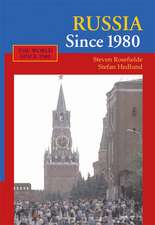Stalin's Successors: Leadership, Stability and Change in the Soviet Union
Autor Seweryn Bialeren Limba Engleză Paperback – 29 apr 1982
Preț: 286.30 lei
Nou
Puncte Express: 429
Preț estimativ în valută:
54.78€ • 57.20$ • 45.24£
54.78€ • 57.20$ • 45.24£
Carte tipărită la comandă
Livrare economică 15-29 aprilie
Preluare comenzi: 021 569.72.76
Specificații
ISBN-13: 9780521289061
ISBN-10: 0521289068
Pagini: 324
Dimensiuni: 154 x 229 x 20 mm
Greutate: 0.42 kg
Editura: Cambridge University Press
Colecția Cambridge University Press
Locul publicării:New York, United States
ISBN-10: 0521289068
Pagini: 324
Dimensiuni: 154 x 229 x 20 mm
Greutate: 0.42 kg
Editura: Cambridge University Press
Colecția Cambridge University Press
Locul publicării:New York, United States
Cuprins
Preface; Introduction; Part I. Stalinism and the Soviet Political System: 1. The mature Stalinist system; 2. Stalin and the Soviet Political elite; 3. Stalinism and the evolution of the Soviet polity; Part II. Succession and Turnover of Soviet Elites: 4. The approaching succession: the top leader; 5. The approaching succession: leadership and elite turnover; 6. The approaching succession: generational change; Part III. The Nature and Extent of Soviet Political Stability: 7. Stability: analytical considerations; 8. Soviet stability and its sources; 9. Soviet political stability and the question of legitimacy; 10. Soviet stability and the national problem; Part IV. Soviet Perceptions of International Affairs and Trends in Soviet Foreign Policy: 11. The Centrality of US-Soviet relations; 12. The arms race and the correlation of forces; 13. The role of the military factor in international relations; 14. The Third World and the translation of power into influence; Part V. Prospects for the 1980s: 15. The politics of stringency; Index.
Recenzii
'… a penetrating view of the Soviet governmental system and its likely future in the 1980s. His dissection of Stalin's rule by mass terror is masterly.' John Barkham, Federal Times
'He displays a mastery of detail and excellent judgment. The book is solidly based on a remarkably broad knowledge of the available data.' Myron Rush, International Security
'Seweryn Bialer is probably the most perceptive observer of Soviet politics, society and foreign policy writing today … His book is a superb and well documented piece of scholarship.' Richard Ullman, Woodrow Wilson School of Public and International Affairs
'In the next decade the world is likely to be a more dangerous place than anything we have known for at least a generation. In order to contain almost certain disorder, we had best try to understand the sources of Soviet conduct, and reading Seweryn Bialer is one of the best ways to begin.' The New York Times
'It is salutary to have a work that asks us to set aside our penchant for facile or ideologically motivated assumptions, and to see the USSR in a dispassionate and icily objective manner.' Washington Post
'He displays a mastery of detail and excellent judgment. The book is solidly based on a remarkably broad knowledge of the available data.' Myron Rush, International Security
'Seweryn Bialer is probably the most perceptive observer of Soviet politics, society and foreign policy writing today … His book is a superb and well documented piece of scholarship.' Richard Ullman, Woodrow Wilson School of Public and International Affairs
'In the next decade the world is likely to be a more dangerous place than anything we have known for at least a generation. In order to contain almost certain disorder, we had best try to understand the sources of Soviet conduct, and reading Seweryn Bialer is one of the best ways to begin.' The New York Times
'It is salutary to have a work that asks us to set aside our penchant for facile or ideologically motivated assumptions, and to see the USSR in a dispassionate and icily objective manner.' Washington Post
















